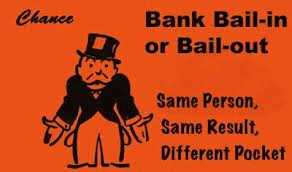Cyprus-style confiscation of depositor funds has been called the
"new normal." Bail-in policies are
appearing in multiple countries directing failing TBTF banks to convert the funds of "unsecured creditors" into capital; and
those creditors, it turns out, include ordinary depositors. Even "secured"
creditors, including state and local governments, may be at risk. Derivatives have "super-priority" status in
bankruptcy, and Dodd Frank precludes further taxpayer bailouts. In a big
derivatives bust, there may be no collateral left for the creditors who are next
in line.
Shock waves went around
the world when the IMF, the EU, and the ECB not only approved but mandated the
confiscation of depositor funds to "bail in" two bankrupt banks in
Cyprus. A "bail in" is a quantum leap beyond a "bail out." When governments are
no longer willing to use taxpayer money to bail out banks that have gambled
away their capital, the banks are now being instructed to "recapitalize"
themselves by confiscating the funds of their creditors, turning debt into
equity, or stock; and the "creditors" include
the depositors who put their money in the bank thinking it was a secure
place to store their savings.
The Cyprus bail-in was not a one-off emergency measure but was consistent with similar
policies already in the works for the US, UK, EU, Canada, New Zealand, and Australia,
as detailed in my earlier articles here
and here. "Too big to fail" now trumps all. Rather than banks being put into bankruptcy
to salvage the deposits of their customers, the customers will now be put into
bankruptcy to save the banks.
Why Derivatives Threaten Your Bank Account
The big risk behind all
this is the massive $230 trillion derivatives boondoggle managed by US banks. Derivatives
are sold as a kind of insurance for managing profits and risk; but as Satyajit
Das points out in Extreme
Money, they actually increase risk to the system as a whole.
In the US after the Glass-Steagall
Act was implemented in 1933, a bank could not gamble with depositor funds for
its own account; but in 1999, that barrier was removed. Recent congressional
investigations have revealed that in the biggest derivative banks, JPMorgan
and Bank
of America, massive commingling has occurred between their depository arms and
their unregulated and highly vulnerable derivatives arms.
Under both the Dodd Frank Act and the 2005 Bankruptcy Act, derivative
claims have super-priority over all other claims, secured and
unsecured, insured and uninsured. In a major derivatives fiasco, derivative
claimants could well grab all the collateral, leaving other claimants, public
and private, holding the bag.
The tab for the 2008
bailout was $700 billion in taxpayer funds, and that was just to start. Another
$700 billion disaster could easily wipe out all the money in the FDIC insurance
fund, which has
only about $25 billion in it. Both JPMorgan
and Bank of America have over $1 trillion in deposits, and total deposits covered by
FDIC insurance are about $9 trillion. According to an article
on Bloomberg in November 2011, Bank of America's holding company then had
almost $75 trillion in derivatives, and 71% were held in its depository arm;
while J.P. Morgan had $79 trillion in derivatives, and 99% were in its
depository arm. Those whole mega-sums are not actually at risk, but the cash
calculated to be at risk from derivatives from all sources is at least $12
trillion; and JPM
is the biggest player, with 30% of the market.
It used to be that the
government would backstop the FDIC if it ran out of money. But section 716 of the
Dodd Frank Act now precludes the payment of further taxpayer funds to bail out
a bank from a bad derivatives gamble. As summarized in a letter from Americans for Financial
Reform quoted by Yves Smith:
There will be no more
$700 billion taxpayer bailouts. So where will the banks get the money in the
next crisis? It seems the plan has just been revealed in the new bail-in
policies.
All Depositors, Secured and Unsecured, May Be at
Risk
The bail-in policy for
the US and UK is set forth in a document put out jointly by the Federal Deposit
Insurance Corporation (FDIC) and the Bank of England (BOE) in December 2012, titled Resolving Globally Active, Systemically
Important, Financial Institutions.
In an
April 4th article in Financial Sense,
John Butler points out that the directive does
not explicitly refer to "depositors." It
refers only to "unsecured creditors." But
the effective meaning of the term, says Butler, is belied by the fact that the
FDIC has been put on the job. The FDIC has direct responsibility only for
depositors, not for the bondholders who are wholesale non-depositor sources of
bank credit. Butler comments:
Do you see the sleight-of-hand at work here? Under the
guise of protecting taxpayers, depositors of failing institutions are to be
arbitrarily, de-facto subordinated to interbank claims, when in fact they are
legally senior to those claims!
. . . [C]onsider the brutal, unjust irony of the entire
proposal. Remember, its stated purpose is to solve the problem revealed in
2008, namely the existence of insolvent TBTF institutions that were "highly
leveraged and complex, with numerous and dispersed financial operations,
extensive off-balance-sheet activities, and opaque financial statements." Yet
what is being proposed is a framework sacrificing depositors in order to
maintain precisely this complex, opaque, leverage-laden financial edifice!
If you believe that what has happened recently in Cyprus is
unlikely to happen elsewhere, think again. Economic policy officials in the US,
UK and other countries are preparing for it. Remember, someone has to pay. Will
it be you? If you are a depositor, the answer is yes.
(Note: You can view every article as one long page if you sign up as an Advocate Member, or higher).






